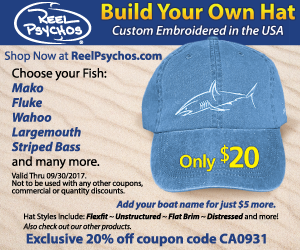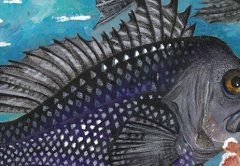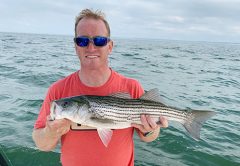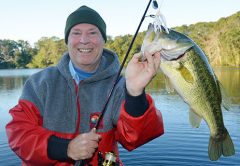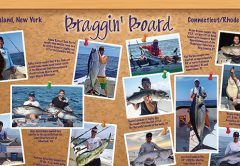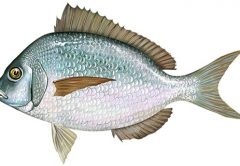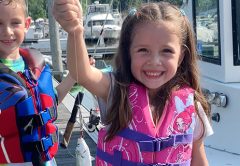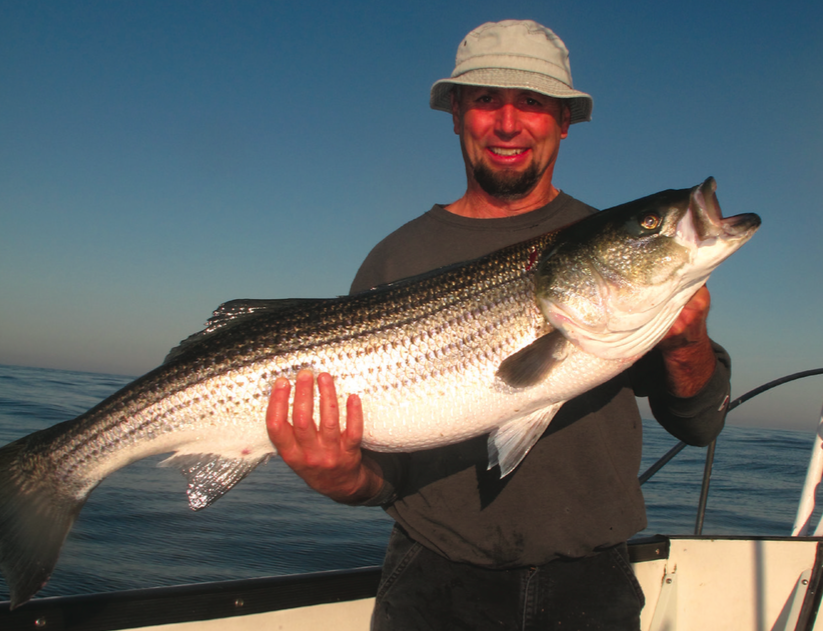
You will frequently find “Bucket List” features in this modest regional section of your local Coastal Angler. Typically, these destination-angling pieces look at one specific port or a combination of place and timing—a specific fishery, that is, whether it’s spring cod on Stellwagen Bank (north of Cape Cod), the jig-and-pop, run-and-gun bluefin tuna fishery east or southeast of Chatham, fall surfcasting at Montauk, summer bass at Block Island.
I have logged almost 15 years editing or contributing to a host of local, regional and national fishing mags, and almost 20 years working deck on a whole host of party, charter, and commercial fishing vessels in an array of targeted fisheries. This is not a brag, just a quick snapshot so you’ll understand that the following points reflect a number of different perspectives (are the product of various “lenses,” so to speak) on the whole destination-fishing racket.
As a writer, I’ve had countless chances to fish world-famous grounds with some of their top respective skippers, while my time running decks for some very sharp fishermen has also given me a pretty thorough understanding of the business of party- and charter-boat fishing, an intimate understanding of Murphy’s Law and the Law of Averages as they pertain to full-time rod-and-reeling, as well as a well- oiled BS detector.
I’ve seen world-class, lock- and-load trips that solidified family bonds and created lifelong memories, and, unfortunately, some absolutely epic misfires—father- son pukestravanagnzas, horrible “character-building” exercises that set “fishing” three rungs below “water-boarding” for the youngest members of many fishing tribes. Chartering has many moving parts beyond weather and fishing conditions, and a trip can succeed for as many different reasons as it can fail: It pays to plan carefully.
As we head into winter fishing show season, and many of you start shopping around for good charters to fish in the coming season, I hope the following points will save you some headaches, and help you line up some memorable distant-waters rod-bending in the not-so-distant future.
KNOW THYSELF
First, best thing you can do to ensure a successful trip is to take a hard, unflinching look at yourself and your crew—the exact nature and extent of your fishing experience, your age(s), skill levels, and general disposition as a crew. If, for example, you’ll be taking three boys under 15 for their first “deep-sea” excursion, think hard about which species they’ll be able to handle without constant adult intervention—the latter a quick way to alienate a few kids who want to take pride in their own accomplishments (not stand next to an immense fish someone else had to reel in for them), and err on the short end of trip length. Try to rough out your group’s hopes for the trip: Is the gear type (i.e. fly or light spinning) of utmost import? Are you five old college friends for whom the trip’s fish tally comes in a distant fourth place after talking and laughing and taking pictures? Are you really hoping to take home a load if fillets? Take it from a guy who’s worked for some of his region’s best charter captains: There’s a distinct possibility that a port’s highliner—the guy who absolutely mohawks the fish every trip ask— very well could be the worst guy in town given your group’s real-world attitude and criteria for success.
KNOW YOUR QUARRY, ASK QUESTIONS
Every season folks flock to my homeport of Point Judith, RI hoping to land a monster, a 40- or a 50-pounder. Many of them arrive in June, when, in a typical year, striper fishing is indeed lights-out good, just as all the fishing reports suggest. Here’s the trouble: barring the headline fish that invariably steal most of the ink, the May and June fishery offers constant action and some eye-popping catch stats, but you won’t typically see numbers of the trophy fish until early or mid- July—a time when action slows a bit but odds of sticking a monster head through the roof.
We also got guys who were adamant that they only wanted to fish live eels on light tackle for their May bass. Great choice, fun fishing, bravo. Then the catch: Bass at Block Island don’t usually start chewing eels reliably at night until at least June. Early on, you can tune the fish, but expect to drag umbrella rigs or snap bucktail jigs on wire—the fish keyed in on squid, sand eels.
Or maybe you want to make a canyon run to catch yellowfins, but you hate the tedium of trolling around all day, want to chunk the fish? You need to understand the logistical realities, the timing issues, and, obviously (?), whether there’s even a viable fishery underway.
One of the biggest problems fishermen encounter in destination fishing—it’s a “men” problem in most things— is that pride prevents us from asking what we view as “googan” or “greenhorn” questions, stupid questions. We end up spending so much time trying to convince our would-be hosts that we know what we’re doing that we forget to ask any of the specific questions that might make that so. Relish, for once, in being the tourist: Ask the stupid question, or better yet, three dozen stupid questions. If you want to impress captain and crew, you might try the severely underrated technique of listening carefully and putting their advice to work.
TIDES, TIMING, TACTICS
If you’ve been hoping to land X species of X size for your entire adult life, set aside your general quest and flush out as much of the fine detail as possible about the target fishery: Are there certain windows of timing that typically witness the best fishing for your intended target? Is tide stage a major factor? Day or night? The moons, or the quarters— the smoking tides or the easier ones off the moons? You might learn, for example, that contrary to everything you know about fishing, the species you want feeds best on slack water or very weak tides. Every species and every region is full of caveats and idiosyncrasies.
Full-time chartermen must fish as days as they can book. If they had the luxury of fishing only peak windows, they’d be hobbyists, and accordingly, many sharper guys get cagey about “right” or “ideal” conditions: You can’t really expect to get straight answers to all your timing questions—at least from the guys you’re likely to charter. You can, however, zero in on a couple of an area’s better tackle shops to fill in some blanks. The quest for reliable intel on your chosen species is, by necessity, a stick-and-move proposition, something you’ll have to patchwork together, getting one tip from a charter captain, two more from a local tackle shop, another from an internet fishing forum.
Of course, if you do manage to identify some peak probable dates for your intended trip, rest assured you’re not the only one privy to the stretches of theoretical perfection on your target species’ calendar. In some places, some fisheries, your best bet, catchwise, will be to book the best guy with whom you can work out an open date—regardless of its timing. In other fisheries— fluke fishing would be a good example—you may be better served to flag a number of days in a tide book like Eldridge that are likely to offer you the greatest amount of running tide during the time windows of a charter fleet’s offered trips. In fluking, which is drift fishing, conditions—a morning, for example, when you’ll get an entire tide, rather than an afternoon with a slack tide right in the middle of the trip—will sometime trump boat reputation. That is, you’d be better off booking a second-tier boat for a top-tier tide than vice versa.
In tautog fishing or deep-water wreck fishing, on the other hand— fisheries that favor skippers who commit real time each season to identifying prime hangs and staying up on migratory patterns—you should book almost exclusively based on a captain’s fishing credentials.
Be sure to check out a prospective boat’s reputation with multiple different sources, like tackle shops, non-competing party or charter operations in the same homeport. You might even try reputable tackle shops outside the state where you plan to book. The party- and charter-fishing racket is a very small world indeed, and most folks will do their best to steer you in the right direction.
THE RIGHT BOAT
It probably goes without saying, but be advised that the internet is not your best search tool for an excellent charter or party boat. Suffice to say there’s no correlation between marketing genius and fish- catching prowess, and it’s never been easier for a fly-by-night charter operation to legitimize itself with a pretty website featuring ample photography, video, and a whole bulleted list of unsupportable claims.
Reciprocally, some of the hands-down fishiest skippers I know suffer a near-debilitating lack of self-promotional zeal, and quite often I’ve noted an inverse correlation between site quality and fishing prowess, where the sharpest captains—guys who stay busy on word-of-mouth almost exclusively and thus have little need or time for additional marketing—sometimes have sites one click short of total embarrassments.
Likewise, be careful about what you read on the various internet fishing forums, where the anonymity of the web often helps to conceal folks with ulterior motives, or in some cases grants a minority of vocal morons the appearance of a much larger consensus. When you see a party boat that targets cod raked over the coals on a forum somewhere, you have to consider the possibility that the guy trashing that business is a disgruntled former customer on a crusade because the vessel’s captain wouldn’t allow him to keep three times the legal limit of fish (which said customer was selling on the black market). This is not to suggest some criticism on the forums is quite valid, merely a word of caution that you should verify what you read on the web, and by all means do all due diligence including calling around and asking specific questions, talking to skippers you’re considering multiple times at the various shows, and if it’s practical, heading to a vessel’s homeport to check up on her real-world condition. While you’re there, consider beating the docks and asking any mates you encounter for their suggestions. We deckhands tend to shoot straight about the real fishermen in our respective ports—especially by way of verifying captains’ personalities, particular strengths or limitations of gear or craft, etc.
POLICIES AND PARTING ADVICE
As you zero in on a decision, comfortable you know enough to make a halfway-informed choice with reasonable odds, there are other considerations. For one thing, I cannot stress enough the danger in basing boat choice on price first and foremost. As in all things—more in chartering than in most other buying choices—you will get what you pay for. Charter fishing is not cheap, but a well-executed trip with a top captain can not only make long-standing fishing goals reality, but teach you a great deal, forge shared memories you’ll remember vividly decades later, or set the hook solidly in your family’s next angling generation.
Be sure, however, to get a clear breakdown on the boat’s weather cancellation, deposit, rescheduling, and trip-downgrade policies to be sure all in your crew have clear expectations. Ask detailed questions about the boat’s policies on fishing gear, the kind of gear you can expect to use in your target fishery, and whether you may target more than one species during a planned trip.
One last word of advice—this one a product of my own years on deck. Wherever you fish, whoever takes you there, and whatever you target, consider: Any full-time party/ charter captain or seasoned mate will know, inside five minutes of casual observation, the real extent of your experience, your skills, and not even the fanciest gear can save you. It’s absolutely staggering how much time and tide get frittered away as captains and mates attempt to spare expert clients embarrassment, or to justify the superiority of their own expertise to that of an “expert” client who fishes their grounds once every two years. If you trust nothing else here, trust this: Everything works better—by far—if you check your ego at the dock.
Trust that you’ve chosen the right boat, and by all means take your captain’s and mate’s suggestions— whether they relate to rigging, your personal gear, or even a late-innings change in the trip game plan. It is the captain’s job to give you a good day on the water, and you can rest assured that he or she will do what is in your crew’s best interest, even if you don’t understand the full range of factors underlying his best guess.
[easy-social-share]

